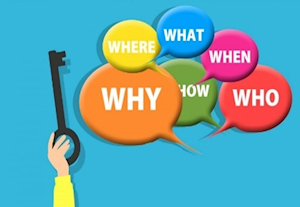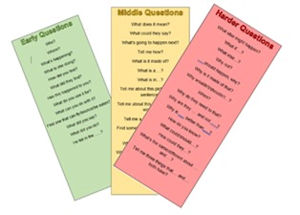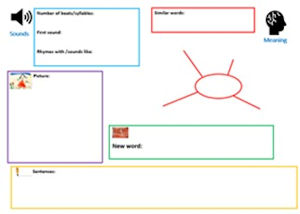- Reading and singing songs together are still important ways to develop your child’s language skills, even as they get older.
- Children with more advanced language skills enjoy word games (e.g. guessing games, I spy games, rhyming games) and telling jokes and stories. Regularly spend time engaging in these fun activities with your child.
- Talk to your child about their day. Keep questions open-ended, however sometimes asking something a little more specific, such as “what was the favourite part of your day today?” rather than a more general “how was your day?” can encourage conversation.
- Chat during everyday activities with your child, e.g. during walks, on the bus or when kicking a football.
Advanced understanding and understanding questions

Advanced understanding
As children’s language skills develop, the language they can understand becomes more advanced and abstract, especially when they enter school. They can start to understand the meaning of more abstract questions, such as ‘why?’, ‘what would happen if?’, and more technical vocabulary, for example, words used in school to describe ideas, such as ‘democracy’, and more complex verbs, such as ‘persuade’, ‘negotiate’, ‘describe’, ‘contrast’.
Understanding questions
Children’s understanding of questioning develops as they begin to be able to understand what information is being asked in order to answer the following questions.
Early questions
What is this? Where do you find it? What is he doing? What’s happening? Who is it? When did it happen?
Middle questions
What could they say? What is it made of? Can you show me something that is not a plant? What’s going to happen next?
Harder questions
What else might happen? How do you know? Why shouldn’t they do that?
How can you help your child understand more abstract questions and harder words?
There are lots of things parents can do at home to support understanding as children’s language skills become more complex.
Top Tips
What can I do to support my child’s understanding of more abstract questions
- Don’t jump to asking questions too quickly - children in the early stages of language learning benefit more from hearing people around them using words rather than asking questions.
- Model and explain your thinking in everyday situations, e.g. “Hmmmm, it looks like it might rain, I think I’ll take an umbrella” to build your child’s underlying understanding of reasoning.
- For school-age children who are able to talk in sentences, you can begin asking questions, such as ‘who?’, ‘where?’, ‘when?’ ‘why’, and ‘how do you know’. Start with easier questions and build up to harder ones. If your child struggles to answer, you can:
- ask a simpler question, “what can you see outside?” “Yes it’s raining. So why do we need an umbrella?”
- give them a choice of answers, “is it because it’s raining or it’s sunny?”
- point things out which might help them answer, “what do you notice here?”
- model the answer yourself, “why do we need an umbrella? Because it is raining!”
- Books with pictures are fantastic tools to use to support your child’s understanding of more abstract questions and their thinking skills. Talk about what you can see in the pictures and ask questions.
- Use everyday family routines to ask questions related to time, “when are we going for a walk? After lunch!”
For further information and to see these ideas in action, watch the video “Book Sharing: Using Books to Develop Language Skills”.
You can download our Question Bookmarks which can help remind you of questions to ask when sharing books with your child.

What can I do to support my child’s understanding of harder words?
It is important as children get older for them to be supported to become active word learners themselves. This means they will be able to support their own language learning and independence throughout life. You can encourage your child to become an active word learner by:
- Encouraging a love of words at home. Talk about your favourite word, and why it is your favourite, or share with your child new words you have come across. Have a ‘Word of the Week’ where family members share words they have learned. If you speak a different language at home, talk about words in that language too.
- Encouraging your child to monitor their understanding. It’s ok if they haven’t understood a word or what you meant, you can explore it together to help them understand.
- Encouraging them to ask what words mean if they are not sure. Praise them when they do ask, “That’s a great question, let’s see if we can find out”.
- Encouraging them to look up meanings of words. Use ‘google define’ or a children’s dictionary.
- Help your child remember new words by using word learning strategies such as:
- Talk about the meaning of the word in simple language.
- Draw or find a picture of the meaning of the word. Google images can be used to help you find pictures of the word.
- Talk about the sounds in the word: the first sound, the last sound, what it rhymes with, how many beats (syllables) are in the word.
- Encourage them to say the word themselves over and over again.
- Talk about similar words (e.g. synonyms).
- Practice putting the word in a sentence.
- Come back to these activities over and over again so they remember the word. You can also use a visual diagram which can be kept in a folder as a ‘personal dictionary’ to refer back to.
- Play word games at home, such as guessing games and describing games.

For further information and to see these ideas in action, watch the following two videos:
“Helping your child learn new words at home” . The strategies for more abstract word learning are towards the end of the video.
You can download our Visual Diagram to help you build your child’s personal dictionary.

Last updated10 Sep 2025

